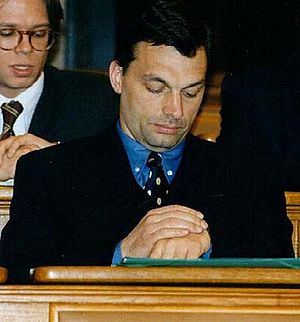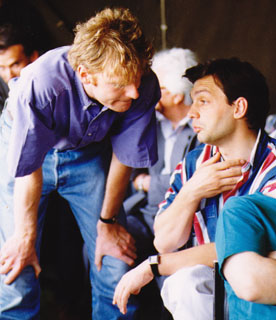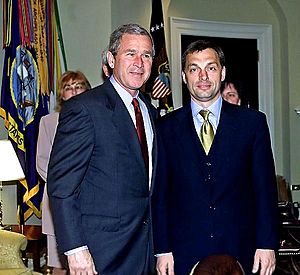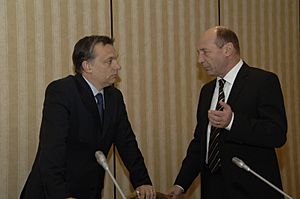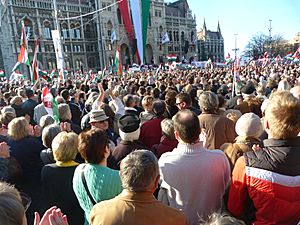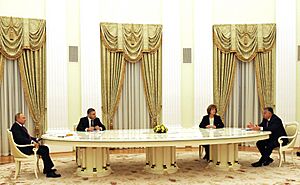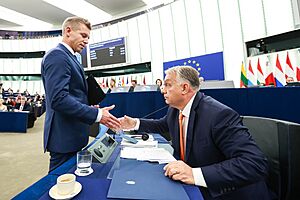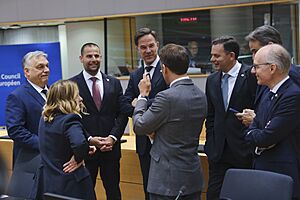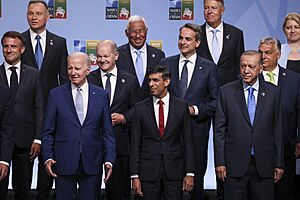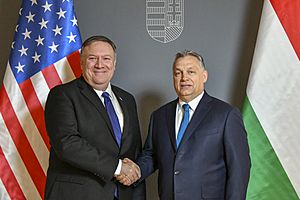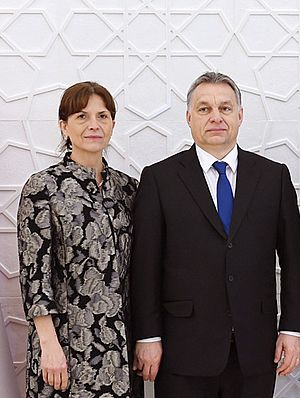Viktor Orbán facts for kids
Quick facts for kids
Viktor Orbán
MP
|
|
|---|---|
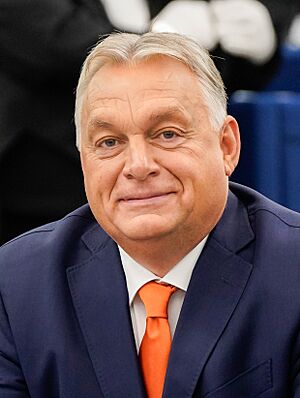
Orbán in 2024
|
|
| Prime Minister of Hungary | |
| Assumed office 29 May 2010 |
|
| President |
|
| Deputy |
|
| Preceded by | Gordon Bajnai |
| In office 6 July 1998 – 27 May 2002 |
|
| President | |
| Preceded by | Gyula Horn |
| Succeeded by | Péter Medgyessy |
| President of Fidesz | |
| Assumed office 17 May 2003 |
|
| Preceded by | János Áder |
| In office 18 April 1993 – 29 January 2000 |
|
| Preceded by | Office established |
| Succeeded by | László Kövér |
| Member of the National Assembly | |
| Assumed office 2 May 1990 |
|
| Personal details | |
| Born |
Viktor Mihály Orbán
31 May 1963 Székesfehérvár, Hungary |
| Political party | Fidesz (since 1988) |
| Spouse |
Anikó Lévai
(m. 1986) |
| Children | 5, including Gáspár |
| Residence | Carmelite Monastery of Buda |
| Education |
|
| Profession |
|
| Signature | |
Viktor Orbán (born 31 May 1963) is a Hungarian lawyer and politician. He has served as the prime minister of Hungary since 2010. Before this, he was also prime minister from 1998 to 2002. He has been the leader of the Fidesz political party for many years. He was re-elected as prime minister in 2014, 2018, and 2022. On 29 November 2020, he became Hungary's longest-serving prime minister.
Orbán was first elected to the Hungarian Parliament in 1990. During his first time as prime minister, from 1998 to 2002, Hungary's economy improved. The country also joined NATO, a group of countries working together for safety. After this, he led the opposition party until 2010.
Since 2010, when he became prime minister again, his government has made several important changes. These include new laws and changes to Hungary's constitution. He often talks about protecting Christian values. He has also worked to build stronger relationships with countries like China and Russia. His policies have sometimes led to discussions with the European Union.
Contents
Who is Viktor Orbán?
Viktor Orbán was born on May 31, 1963. He grew up with two younger brothers. His family lived in Alcsútdoboz and later moved to Felcsút. His father worked at a local farm collective. Orbán went to school in Felcsút and Vértesacsa. In 1977, his family moved to Székesfehérvár. There, he attended the Blanka Teleki school.
After high school in 1981, Orbán completed his military service. He later said this time changed his political views. In 1983, he began studying law at Eötvös Loránd University in Budapest. He joined a special college for law students. There, he met other future politicians like Gábor Fodor and László Kövér.
In 1986, Orbán wrote his master's thesis about the Polish Solidarity movement. After earning his law degree in 1987, he worked as a sociologist in Budapest. In 1989, he went to Pembroke College, Oxford for a research fellowship. He returned to Hungary in 1990 to run for parliament.
Starting His Political Journey
On March 30, 1988, Orbán and other students founded the Alliance of Young Democrats (FIDESZ). This group was a new political movement. It challenged the existing youth organizations. Fidesz's journal, Századvég, became its official publication.
On June 16, 1989, Orbán gave an important speech in Heroes' Square, Budapest. He spoke at the reburial of Imre Nagy, a national hero. In his speech, he called for free elections and the departure of Soviet troops. This speech made him well-known across Hungary.
In 1989, Fidesz became a political party. After returning from Oxford, Orbán was elected to the parliament in 1990. He led Fidesz's parliamentary group until 1993.
On April 18, 1993, Orbán became the first president of Fidesz. Under his leadership, Fidesz changed from a student group to a center-right political party. This change caused some members to leave the party.
In the 1994 Hungarian parliamentary election, Fidesz won enough votes to enter parliament. Orbán became a Member of Parliament for Fejér County. He worked on European integration issues. In 1995, Fidesz added "Hungarian Civic Party" to its name.
In September 1992, Orbán was elected vice chairman of the Liberal International. Later, in November 2000, Fidesz left this group. They joined the European People's Party (EPP), a larger group of center-right parties in Europe. Orbán became a vice-president of the EPP in 2002.
First Time as Prime Minister (1998–2002)
In 1998, Orbán formed a government with other conservative parties. He became the prime minister of Hungary at 35 years old. He was one of the youngest prime ministers in Hungary's history. He was also the first post-Cold War leader in the region who had not been a member of a communist party.
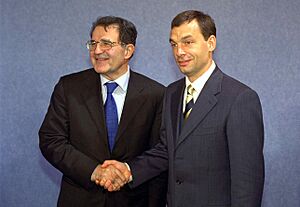
During his first term, the government made some changes to how parliament worked. These changes were met with opposition. There were also discussions about replacing leaders of important national institutions.
Hungary's Economy
Orbán's economic plan focused on lowering taxes. It also aimed to reduce inflation and unemployment. His government removed university tuition fees. They also brought back universal maternity benefits. The government worked to reduce the national budget deficit.
The economy saw good results. Inflation dropped from 15% in 1998 to 7.8% in 2001. Hungary's economy grew steadily each year. The national debt also decreased.
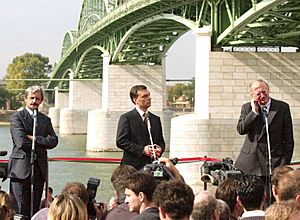
Foreign Relations
In March 1999, Hungary joined NATO. This meant Hungary became part of a military alliance. It also led to Hungary's involvement in the Kosovo crisis. The country also began modernizing its army.
Hungary also gained international attention for its "status law" in 1999. This law aimed to support ethnic Hungarian minorities in neighboring countries. It offered them education, health, and employment benefits. Some neighboring governments saw this as interference. However, the law was later adjusted after agreements with Romania and Slovakia.
Leading the Opposition (2002–2010)
In the 2002 parliamentary elections, Orbán's party lost to the Hungarian Socialist Party. This party then formed a government with its allies. Voter turnout was very high. Orbán's future as Fidesz leader was questioned after this loss. However, he was re-elected as party president in 2007.
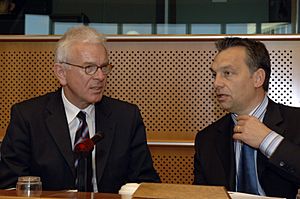
In 2004, Fidesz won a large victory in the European Parliament election. They gained 47.4% of the vote and 12 seats. In 2006, Fidesz also won the municipal elections. They won in many of Hungary's largest cities.
In 2008, a national referendum was held. It was about government reforms that introduced fees for doctor visits and university tuition. Fidesz started this referendum. The public voted to remove these fees, which was a big win for Fidesz.
In the 2009 European Parliament election, Fidesz won by a large margin. They received 56.36% of the votes and 14 seats.
Back as Prime Minister (2010–Present)
In the 2010 parliamentary elections, Orbán's party won a large majority. They secured enough seats to change the constitution. In 2011, Orbán's government created a new constitution. This new constitution included support for traditional values and references to Christianity. It also changed the number of seats in parliament. The new constitution took effect on January 1, 2012.
Key Changes and Policies
In 2012, Orbán's government introduced a flat tax of 16% on personal income. He described his government as "pragmatic." They made changes like restricting early retirement for police and military. They also aimed to make welfare programs more transparent.
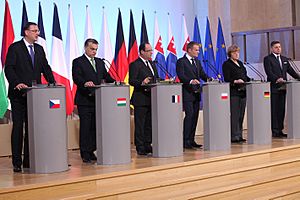
In 2014, Orbán signed an agreement with Vladimir Putin in Moscow. This agreement was about the Paks II nuclear power plant. A Russian company would build the plant. Hungary would finance it with a loan from Russia.
After the 2014 parliamentary election, Fidesz again won a majority. In a speech in July 2014, Orbán talked about his vision for Hungary. He described it as finding a new way for the country to be competitive globally.
In November 2014, Orbán proposed an "internet tax." This led to protests against his government.
During the 2015 European migrant crisis, Orbán ordered the building of a fence on Hungary's border with Serbia. This was to control the entry of migrants. Hungary took steps to manage immigration and refugee numbers. In 2020, the European Court of Justice ruled against Hungary's migrant transit zones. Orbán then changed the country's asylum rules.
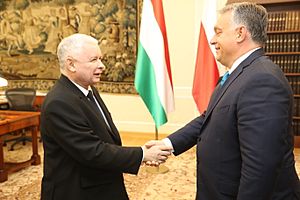
Orbán, like other Visegrád Group leaders, opposes mandatory EU quotas for redistributing migrants. He believes that countries like Turkey should be considered safe for refugees. He has stated that Europe's immigration policy is "madness." He proposed six points to the European Union to handle the crisis. These included border surveillance and separating refugees from economic immigrants.
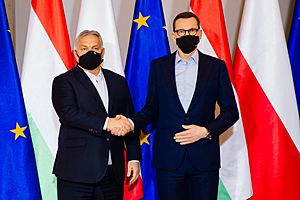
In the 2018 Hungarian parliamentary election, Fidesz won another two-thirds majority. Orbán remained prime minister. His campaign focused on immigration and national independence. In a 2018 speech, Orbán said Hungary does not want its culture to mix with others.
In March 2020, the Hungarian parliament passed legislation for a state of emergency. This allowed the prime minister to rule by decree for a period. This state of emergency ended in June 2020. However, a new law allowed the government to declare future "medical" emergencies by decree.
In 2021, control of 11 state universities was transferred to foundations. These foundations were led by people close to Orbán. The Mathias Corvinus Collegium received significant government funding. This was to train future conservative thinkers.
In October 2021, Orbán blamed rising energy prices on the European Commission's Green Deal plans. He argued that these plans were harming Europe's middle class. Despite his anti-immigration stance, Hungary increased foreign worker immigration in 2019 due to labor shortages.
In the 2022 Hungarian parliamentary election, Fidesz won another majority. Orbán declared a big victory. He said that Hungary should preserve its Christian roots. He also stated that Central European nations should work together on this.
In July 2022, Orbán spoke about preserving European culture. He later clarified that he was talking about cultures, not races. In 2023, Orbán criticized the EU's new migration pact. He said that secure borders were no longer in place. In 2024, he called immigration to Europe an "existential issue." He warned that Hungary was ready to take legal action against the European Commission.
In July 2024, Ukrainian President Zelensky decided to stop the overland transfer of Russian petroleum products to Hungary. Orbán's government strongly protested this. When Croatia suggested using the Adria pipeline, Orbán refused. His foreign minister said it was unreliable.
In October 2024, Orbán addressed the European Parliament during Hungary's presidency of the European Council. He faced criticism from some European leaders. They questioned Hungary's support for Ukraine and its economic management.
Hungary's Place in the World
Orbán has attended the inauguration ceremonies of Turkish President Recep Tayyip Erdoğan. In 2018, Orbán said that a stable Turkish government is important for Hungary's security. This is especially true regarding overland migration. In June 2019, Orbán met with Myanmar's State Counsellor Aung San Suu Kyi. They discussed bilateral ties and migration.
Relations with China
Orbán has kept close ties with China during his time in office. His government is seen as a strong ally of China within the EU. Hungary joined China's Belt and Road Initiative (BRI) in 2015. In 2019, Orbán attended a BRI forum in Beijing. He met with Chinese leader Xi Jinping there. He also supported plans to open a Fudan University campus in Budapest. This plan faced some opposition in Hungary. In February 2023, he met with Chinese diplomat Wang Yi in Budapest. Orbán then supported China's peace plan for the conflict in Ukraine.
Relations with Russia and Ukraine
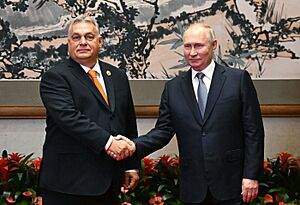
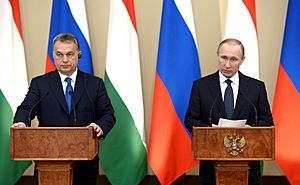
Orbán has questioned the Nord Stream 2 gas pipeline project. He asked why it was good while the "South Stream" pipeline was not. "South Stream" was a Balkan pipeline that Russia canceled in 2014.
Since 2017, Hungary's relations with Ukraine have faced challenges. This is due to issues concerning the Hungarian minority in Ukraine. Orbán's government has criticized Ukraine's 2017 education law. This law made Ukrainian the main language of education in state schools. Hungary threatened to block Ukraine's EU integration until the law was changed. The law was later amended in December 2023 to favor official EU languages, including Hungarian.
Orbán has had a complex stance on Russia and Vladimir Putin. In February 2022, Orbán was the first EU leader to meet with Vladimir Putin in Moscow. He called it a "peacekeeping mission." They also discussed Russian gas exports to Hungary.
He supported Ukraine's membership in the European Union.
On October 16, 2025, Orbán announced that Hungary had started preparing for the 2025 Budapest Summit. This followed a phone call with Donald Trump.
Ties with Turkic States

Since 2014, Hungary has been an observer at the General Assembly of Turkic-speaking States. In 2017, it applied to join the International Turkic Academy. During the 6th Summit of the Turkic Council, Orbán said Hungary wants closer cooperation. In 2018, Hungary gained observer status in the council. In 2021, Orbán noted that Hungarian and Turkic peoples share a long history and culture. He said Hungarians are proud of this heritage. In 2023, during a visit to Kazakhstan, Orbán said Hungarians feel a connection to Kazakhstan due to "millennial common roots."
Support for Israel
The Hungarian government has expressed support for Israel in the Gaza war. On October 13, Orbán stated that "Israel has the right to defend itself." He added that Hungary would not allow rallies supporting terrorist organizations. On October 22, Fidesz announced it would introduce a statement condemning Hamas terrorism in parliament.
In April 2025, Israeli Prime Minister Benjamin Netanyahu visited Budapest. During this visit, the Hungarian government announced that Hungary would withdraw from the International Criminal Court (ICC). They described the ICC as "politically biased."
Orbán's Political Ideas
Orbán's political approach combines soft Euroscepticism, populism, and national conservatism. He has been compared to other conservative leaders in Europe and beyond. Orbán aims to make Hungary an "ideological center" for a global conservative movement.
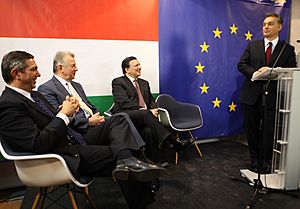
His political ideas often highlight the importance of national sovereignty. He also shows a clear distrust of Europe's ruling groups. Orbán frequently emphasizes Christian values. His appeal to "global conservatives" focuses on protecting national culture. He has criticized the EU, sometimes comparing it to historical forces that occupied Hungary.
Orbán has had a close relationship with Israeli Prime Minister Benjamin Netanyahu. They have known each other for decades. Orbán received advice on economic reforms from Netanyahu. In 2019, Netanyahu thanked Orbán for extending Hungary's embassy in Israel to Jerusalem.
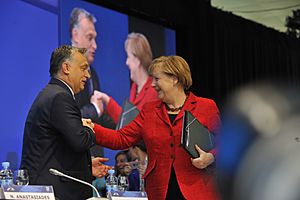
Orbán's political views were clearly laid out in a 2014 speech in Băile Tușnad. He spoke about organizing the national community through the state. He argued that this kind of state respects civic rights. However, it focuses on the community, not just individuals. He said such a state should promote national self-sufficiency, national sovereignty, and familialism. It should also aim for full employment and preserve cultural heritage.
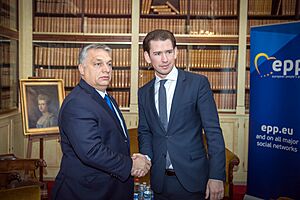
His time as prime minister has led to international discussions. Some critics have described his policies as centralizing power. They also say his policies have restricted some freedoms. However, the European migrant crisis has made Orbán's nationalist policies more popular among some European conservative leaders.
In a 2018 speech, Orbán said that many people want to see the end of Christian Europe. He believes they want to replace its culture with others.
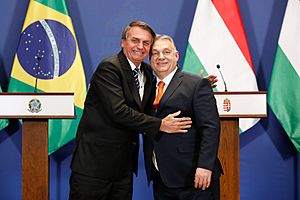
In January 2019, Orbán praised Brazil's then-president Jair Bolsonaro. He said that modern Christian democracy could be best defined in Brazil.
A think tank called the Danube Institute was created in 2013 to support Orbán's ideas. It is funded by the Hungarian government. The institute hosts conferences and publishes periodicals.
- In the United States
Orbán has often criticized the administrations of presidents Barack Obama and Joe Biden. He particularly focused on their immigration policies. Some experts believe his criticisms are mainly for his voters in Hungary.
In January 2022, Donald Trump endorsed Orbán for the 2022 Hungarian parliamentary election. Trump praised Orbán for loving his country and wanting safety for his people. He also praised Orbán's firm immigration policies.
In August 2021, Tucker Carlson hosted parts of his show from Budapest. He praised Orbán as a leader who identifies as a Western-style conservative.
In May 2022, the Conservative Political Action Conference (CPAC) held an event in Budapest. In August 2022, Orbán was the opening speaker at CPAC in Dallas, Texas.
Focus on Families and Economy
Viktor Orbán's domestic policies focus on cultural conservatism. This includes policies to encourage families and reduce immigration. For example, female university graduates who have children can get their student loans forgiven. Hungarian women with four or more children receive a full income tax exemption for life. Married couples can get low-interest mortgages and financial support for housing. There are also subsidies for larger cars for families with three or more children.
Orbán stated in 2019 that Hungary needs "Hungarian children," not just numbers. His government has also made legal changes regarding access to healthcare services. The number of such services provided in Hungary fell significantly between 2010 and 2023.
The Guardian reported that the "Hungarian government doubled family spending between 2010 and 2019." This was to encourage a lasting change in population trends. Orbán has supported investments to counter the country's low birth rates. He has stated that Europe should be populated by Europeans.
His government's economic approach is called "Orbánomics." Despite initial concerns, Hungary's economy has grown strongly. Unemployment fell between 2010 and 2021. Annual GDP growth was 4 percent in 2021. Progressive taxation on income was replaced with a flat rate of 16% in 2015. Income taxes for those aged 25 or younger were removed in 2021. Hungary paid off its IMF loan early in 2013.
In December 2018, Orbán supported a change to the labor code. This change increased the annual limit on overtime hours.
Orbán's government has supported conservative think-tanks and cultural institutions. The Mathias Corvinus Collegium has bought stakes in European universities. It also purchased the Modul University Vienna. The think tank opened a branch in Brussels in November 2022. In 2021, Orbán's government privatized 11 Hungarian universities. These universities received billions of euros in assets from the state budget. The government appointed conservatives to their supervisory boards.
As part of a plan to promote Christian values, his government has privatized many state-run schools. It has also involved Christian churches in education. Religion classes were introduced into the national curriculum. Financial support was given to more Christian schools. The kindergarten curriculum was changed to promote "national identity, Christian cultural values, patriotism, attachment to homeland and family." Between 2010 and 2018, the number of Catholic schools increased significantly. The government also created the Center for Fundamental Rights in 2013. This center aims to preserve national identity and Christian social traditions. In 2019, the government passed a law taking control of the Hungarian Academy of Sciences.
Views on Climate Change
When US President Donald Trump decided to leave the Paris Agreement on climate change in 2017, Orbán stated that climate change is real and dangerous. He said it requires global action.
In October 2021, Orbán warned that the European Commission's Fit for 55 climate package could harm Europe's middle classes. He called the European Union's climate protection plans a "utopian fantasy."
In June 2024, Orbán supported the green transition. However, he criticized how it was being implemented by the "current Brussels elite."
Personal Life and Hobbies
Orbán married lawyer Anikó Lévai in 1986. They have five children. Their eldest daughter, Ráhel, is married to entrepreneur István Tiborcz. Orbán's son, Gáspár, is a retired footballer. He played for the Ferenc Puskás Football Academy. Gáspár is also a founder of a religious community called Felház.
Orbán is a member of the Calvinist-oriented Hungarian Reformed Church. His wife and children were raised Catholic. His son Gáspár Orbán converted to the Faith Church in 2014. He is now a minister.
The Hatvanpuszta estate was purchased in 2011 by a company owned by Viktor Orbán’s father. This estate has been redeveloped.
Love for Football
Orbán has played football since he was a child. He was a professional player with FC Felcsút. After his football career, he became a major supporter of Hungarian football. He supported his hometown club, Felcsút FC, which was later renamed the Ferenc Puskás Football Academy. He played a key role in founding the Puskás Akadémia in Felcsút.
He also helped establish the annual international youth cup, the Puskás Cup. This cup is held at the Pancho Aréna in Felcsút, which he also helped build. His son, Gáspár, trained there.
Orbán is known to watch many football games. His first trip abroad as prime minister in 1998 was to the World Cup final in Paris. He has reportedly not missed a World Cup or Champions League final since.
In 2009, then FIFA President Sepp Blatter visited the Puskás Academy. Blatter, along with Ferenc Puskás's widow and Orbán, announced the creation of the new FIFA Puskás Award during that visit. Orbán also played a small role as a footballer in a Hungarian family film in 1983.
Awards and Recognitions
Foreign
 Bosnia and Herzegovina (
Bosnia and Herzegovina ( Republika Srpska):
Republika Srpska):
 France:
France:
 Grand Cross of the National Order of Merit (2001)
Grand Cross of the National Order of Merit (2001)
 Kazakhstan:
Kazakhstan:
 Lithuania:
Lithuania:
 North Macedonia:
North Macedonia:
 Serbia:
Serbia:
 Vatican:
Vatican:
Confessional
- Holy Cross Medal of Gratitude (Armenian Catholic Church, 2022)
- First Class of the Order of Glory and Honor (Russian Orthodox Church, 2023)
- First Class of the Order of St. Sava (Serbian Orthodox Church, 2022)
Other Honors
- Honorary senator of the European Academy of Sciences and Arts (2000)
- Freedom Award by the American Enterprise Institute (2001)
- Franz Josef Strauss Prize from the Hanns Seidel Foundation (2001)
- Polak Award established by the Maria Polak Foundation (2001)
- Prize for the Social Market Economy by the German Club of Economics (2002)
- Honorary Citizen of Szék, Hungary (2002)
- Saint Stephen Award (2002)
- László Tőkés Award by the László Tőkés Foundation (2003)
- Honorary Citizen of Esztergom, Hungary, twice (2006, 2009)
- Gold Medal of the Foundation of European Merit (2004)
- World No Tobacco Day Award by the World Health Organization (2013)
- Title 'Man of the Year 2013' by Polish magazine Gazeta Polska (2014)
- 'The 28 People From 28 Countries Who Are Shaping, Shaking And Stirring Europe: Class Of 2016' by magazine Politico Europe
- Title 'Man of the Year 2015'at the Economic Forum in Poland (2016)
- FINA Order of Merit (2017)
- Golden Order of the Azeri international magazine My Azerbaijan (2022)
- Supreme Order of Turkic World (6 November 2024)
Honorary Doctorates
- Tufts University (United States, 2002)
- Josai University (Japan, 2013)
- Marmara University (Turkey, 2013)
See Also
 In Spanish: Viktor Orbán para niños
In Spanish: Viktor Orbán para niños
- First Orbán Government
- Second Orbán Government
- Third Orbán Government
- Fourth Orbán Government
- Fifth Orbán Government
- Orbanomics
- List of prime ministers of Hungary by tenure
 | Sharif Bey |
 | Hale Woodruff |
 | Richmond Barthé |
 | Purvis Young |


